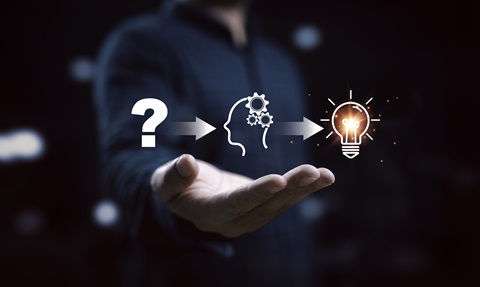Launch of Nanyang Centre for Marketing and Technology: Panel Discussion
Decoding Tomorrow’s Markets: The Role of AI in Shaping Market Efficiency, Differentiation, and Consumer Engagement

The Nanyang Centre for Marketing and Technology was officially launched on 7 February at Gaia, located in NTU Singapore’s Nanyang Business School (NBS). This new research centre is committed to pioneering cutting-edge strategies and inventive solutions at the convergence of the marketing and technology domains.
As part of the launch, a panel discussion titled 'Decoding Tomorrow’s Markets: The Role of AI in Shaping Market Efficiency, Differentiation, and Consumer Engagement' was held. It featured Mr. Kenneth Choo, Managing Director of Heineken Asia Pacific; Mr. Krishnan Menon, President of Experience, Asia at Ogilvy; and Mr. Sotis Dramalis, Senior Vice President and Chief Marketing Officer for Asia Pacific & Japan at SAP. The session was moderated by Prof Gemma Calvert, from the Division of Marketing, NBS.
The following is an edited transcript:
Mr Kenneth Choo on how AI has transformed his industry
So, I went to GPT and asked, "What's the answer to the question?" Let me quickly summarise the answer before I provide more details. First, AI can enhance supply chain management, boost productivity, optimise inventory, and cut logistics costs. Second, AI enables personalised marketing and refined customer segmentation, leading to more targeted marketing efforts. Third, AI aids in product development by analysing consumer data for trend identification, facilitating more targeted marketing. Fourth, AI streamlines routine task automation, enhancing efficiency and reducing costs. And finally, the use of AI in the consumer goods industry is expected to rise, along with increased collaboration with other technologies. However, ethical and social challenges must be carefully considered in the future.
Now, regarding the disruption in our industry, when assessing GPT's answers, they seem logical, acceptable, but somewhat average. AI provides satisfactory but not exceptional solutions, setting a common standard. AI excels in tasks previously impossible for humans, notably in efficiency. Yet, in terms of creativity, there's room for improvement beyond AI's capabilities. To offer a more insightful answer, consider a scenario where individuals subscribe to tailored services based on their preferences, offering discounts for on-time delivery and personalised needs. While cost is a factor, human complexity involves desires beyond mere efficiency or price considerations. Marketing's allure lies in fulfilling unattainable desires, distinguishing between needs and desires, like choosing an AP (Audemars Piguet) watch over an Apple watch. This complexity underscores the importance of recognising that not everything revolves around efficiency or cost alone.
Mr. Krishnan Menon elaborates on the transformative impact of AI across various industries
Everyone seems to be in a frenzy, right? But honestly, AI has been around for ages, and we've been using it. There are a couple of experts in the room who are fully immersed in dynamic data usage.
AI has been crunching data for us for many years now. Let's not dwell so much on Gen AI, but rather on AI and its contributions. I believe it's been bringing us closer together.
Think of the spectrum from one to many on one side to one to one on the other. AI is nudging us towards the one-to-one end. It enables us to analyse data, understand consumers at scale, and engage them in dialogue. It's bridging the gap towards one-to-one interaction.
We've seen some great examples of this in the past. What Gen AI has done is turbocharge that process. It's enhancing our ability to truly connect on a one-to-one level, which I hope we'll witness more of soon.
Currently, AI is primarily used for surface-level tasks, and Gen AI is driving that. But I believe AI's role and its capacity to handle vast volumes of data are reshaping our world today. Personally, much of my career has been in CRM, loyalty, and data-driven marketing. It's all about understanding consumers deeply, beyond demographics, into psychographics, motivations, and emotions.
Being able to do that enables us to craft communications that truly resonate emotionally. We're not just thinking machines; we're feeling machines that also think. Our purchase decisions are emotional, yet much of the communication directed at us is rational.
With AI's advancements, particularly in one-to-one interactions, we're now capable of triggering emotions and motivations on an individual basis, which is incredibly exciting.
I also want to mention the logo you saw earlier (referring to Coke). Its origin actually stems from Gen AI. About 18 months ago, when we discussed the concept, I remember feeling so enthusiastic about it, thinking, "We can create a logo like this!" So, we tinkered around with some tools, and after a few iterations, that logo emerged. It just goes to show that AI is deeply ingrained in our work.
Mr. Sotis Dramalis on the effect of Generative AI on creativity
I must admit we had a brief discussion before this meeting. We discussed the potential of AI to help us stand out from our competitors. Is that really the case, though? Or could it actually lead to decreased differentiation?
It's a big question, isn't it? I believe that personalisation, which AI offers, is a key efficiency factor.
When it comes to differentiation, I lean towards a balanced perspective. If everyone is using the same standard marketing tactics, AI might simply replicate rather than innovate.
We've seen instances where AI has faltered, offering inappropriate offers to customers via the wrong channels at the wrong times. Human oversight can prevent most of these errors. In B2B marketing, especially, where we collaborate with numerous chat services globally, AI could potentially assist and eventually streamline operations for greater efficiency. However, I don't believe that every task can be fully automated.
Mr Kenneth Choo on the most significant challenges in integrating AI in his organisation
Well, I believe the first step is to begin with data collection. However, collecting data isn't always straightforward. Structuring the data and ensuring consistency across different countries can be challenging. Currently, we're still in the early stages, especially considering the variation in data availability between countries.
While developed countries like those in Europe, the US, and Japan may have efficient data systems, regions like Southeast Asia face fragmentation in data collection due to geographical obstacles. This presents a significant challenge, as the type of data available and the desired insights vary depending on the context, whether it's B2B or B2C.
Establishing a data culture within the company is essential, starting with acquiring the necessary data and then learning how to leverage it effectively. Defining the right questions to ask and understanding what insights we aim to gain are ongoing processes. We're continuously learning, often with the assistance of consulting firms like Fuchsia's company, to maximise the benefits of our data. While there are significant opportunities, realising its full potential remains a work in progress.
Mr Krishnan Menon on the potential threat posed by Gen AI to the industry such as the concern that AI might replace human jobs
I believe Gen AI can only make us better. So, Gen AI won't replace creativity but rather the execution of creative ideas. It's not about replacing creative individuals but empowering those who understand how to utilise Gen AI effectively. There's a generation of people in every industry who need to adapt to this change. It's not just about impacting the creative industry; it will affect every sector. The aim is to enhance efficiency in downstream tasks, freeing up talent for more creative and innovative endeavours. This shift will benefit every part of the industry. Recently, there have been brilliant examples where AI played a crucial role in award-winning campaigns. For instance, Shah Rukh Khan and Cadbury's campaign used AI at its core, generating campaigns rapidly. Similarly, MasterCard Poland's "Where to Settle" campaign utilised AI to assist Ukrainian refugees in finding suitable locations to settle. These examples illustrate how AI enhances creativity rather than threatening it.
Mr Sotis Dramalis on the impact of AI on the B2B industry
Well, there are several thoughts to consider here. I believe we need to debunk a common myth first. AI in B2B and tech isn't a recent development. I recall using AI back in 2011 when I first arrived in Singapore, employing predictive models to anticipate which customers might be interested in certain SAP products in the coming years. While it didn't mean everyone bought everything, the concept isn't entirely new. Take Amazon, for instance, which began offering recommendations based on customer purchases decades ago.
AI, in its most fundamental form, has been around for quite some time. It enhances efficiency and compels us to innovate and strategise more effectively, fostering increased competitiveness. In the broader B2B context, companies like SAP, where I work, offer AI technology across various domains such as HR, marketing, and supply chain management. However, AI also raises ethical concerns. Take the case of Target in the U.S., which used predictive analytics to target pregnant women with promotional material, potentially raising ethical questions about privacy and targeting accuracy.
Moreover, AI's effectiveness may vary across different regions, languages, and demographics. It may predominantly cater to English-speaking consumers, leaving out other segments. Additionally, there's a generational gap in tech proficiency, which could affect decision-making processes, especially if decision-makers are older and less familiar with AI tools. This highlights the importance of understanding the limitations and complexities associated with AI adoption.
While AI undoubtedly boosts efficiency, it's crucial to navigate its implications carefully, considering factors like demographic diversity and ethical considerations. Despite its limitations, AI holds immense potential to revolutionise various industries, including marketing. To remain at the forefront of innovation, maintaining a balance between embracing technology and upholding ethical standards is essential.
Mr Krishnan Menon on the increased usage of Chat GPT and other Gen AI technologies – whether the technology would improve with more usage or regress to the mean
Actually, it doesn't work like that – it's not that everything anyone is saying is from Chat GPT or what it tells someone else. It's all about the prompt. It's how you refine it.
The best users of GPT-4 I've seen produce fantastic results because they put effort into it. It's not simple, actually. You start, you receive the first response, then you refine the prompt based on that initial response.
You take pieces of it, pieces of the fourth one, pieces of the fifth one, and re-engineer the prompt for the seventh time. It takes a while. But when you finally get it, like people who use DALI well, people who use Stable Fusion well, really do a good job, and I've seen fantastic work come out of it, but it takes time. It's actually not an easy thing. Many people who use it give up after the first attempt, right? Today, there's actually, I think it's GPT-4, that helps you refine your prompt.
Like, you write the prompt, and it asks, "Should I improve the prompt for you?" It helps make the prompt better, right? But if you engage in a conversation with it, if you speak to it, and that's what LLMs are about, right? So, if you communicate with it in that language, and you say, "I like what you did there, take that piece, and I'll make you add something else. Can you enhance this? Can you incorporate this?" Oh, you left out a little bit that I really liked. But eventually, you get to a piece that is close to what you want.
Then the real work begins. Then you take it out, and you start working on it.
Mr Sotis Dramalis adds on
I agree with Krishnan. First of all, I would never let AI create my logo as a marketer, right (no offence intended). You can recreate the logo but think about what this analogy actually does for you. I would still want an amazing agency like Ogilvy to create a uniquely differentiated logo for me that serves a global purpose, that is well-researched, that is actually a unique idea, and that serves my very, very specific purpose and allows me to stand out.
I don't want to be a “Me Too” logo in the market, but number one. And I would probably pay Krishnan a lot of money for that. But I would actually pay a lot of money in the case that I went to Krishnan and said, "Hey, Krishnan, I paid you a lot of money for this logo. Now take this logo and use AI to create a ton of content for me and actually get it personalised. Cut me a million versions of this and save a lot of money by using AI. But then use these savings to put it into execution. Buy me print media, buy me digital media, buy events, whatever my channels are, and actually shift my marketing investments towards the generation of results and not towards the generation of content that never gets out of the door, right?
Because content actually has consumed most of my budgets in the past. So I think it just really ties the entire value chain. You want something very unique at the beginning, then you want mass production of content, which AI can do, but then you still want to be in the right channels with your offers,. To get out in front of the customer, to the right customers. Soit's probably a revolution of the value chain, but it doesn't mean that all the work can be absorbed by AI.
Mr Kenneth Choo on the upcoming AI technologies and trends, and how he intends to incorporate them into his business strategy:
I believe the possibilities are boundless. Firstly, for consumer companies, the focus lies on targeted marketing, leveraging data to pinpoint consumers by various demographics such as age, region, or interests, and making it more precise. I completely align with Sotis' perspective on this. We classify our approach as working on non-working ATL, where the budget shift is evident towards achieving tangible results. Consequently, the dynamic of communication with creative agencies is also evolving.
While discussing initiatives like mobile optimisation, we may not solely rely on AI to craft a final product, but it can provide us with a preliminary approximation, allowing us to refine and enhance the concept further. AI's role in generating graphics and videos presents exciting opportunities for the future. Looking ahead, there's concern among actors and actresses about AI potentially replacing them. However, I envision a future where personalised movies and advertisements tailored to individual preferences become the norm.
We are currently in the midst of exponential growth potential, especially in utilising data to achieve greater targeting and learning from both successful and unsuccessful launch campaigns. By analysing case studies from various launches, we can amalgamate successful elements to refine our strategies further, leading to continuous improvement and sharpening of our approaches.
Prof Gemma: Thank you. So one of the quiz questions we had was about what marketing entails, and the notion of telepathy, predicting consumer desires, came up. How do you envision integrating this forward-thinking approach into your strategies for the future? Where do you anticipate these developments are leading, particularly concerning telepathy?
Mr. Krishnan Menon: I think for me, personalisation is what I'm aiming for. As a consumer, forget about being a marketer or anything else. We were discussing hotels the other day.
Imagine if when you checked into a hotel and got to your room, the setup, because your Bon Voyage membership knows enough about you, is tailored to your preferences as a traveller. Different zones or themes that you enjoy, maybe even including pictures of your family. Walking into a personalised hotel room would be a game-changer, right? And having AI facilitate such experiences is beneficial. I don't know if you all remember, there was a big uproar a couple of years ago when someone spotted a camera on the Singapore Airlines seat back video screen.
It made headlines, and social media was abuzz with concerns about privacy, questioning if they were spying on us. Yes, because all Singapore Airlines wants to do is watch you in your economy class seat like this all night. The thing was, 12 years ago, when those Panasonic panels were designed, some engineer at Panasonic decided it was a good idea to install a camera there, thinking it would be useful for immigration clearance on the plane. Smart move, right? Singapore can do it today. So it can be a STB and SQ collaboration. On any Singapore Airlines flight, once you hit 10,000 feet on descent, you should be able to clear immigration.
So upon landing, you can go straight to baggage clearance because the necessary bandwidth and processing schemes exist, and all the information is already available. Your passport is scanned, all the details are in the SGRI log file. So it would take you just a minute to clear immigration on the plane. So personalisation and the ability to simplify life is what I'm aiming for.
And all of this is possible, but it's not yet widely implemented.
Final remarks from Mr. Sotis Dramalis
Personalisation, absolutely. I think, from a forward-thinking perspective, AI will reshape the future of marketing. Every B2B organisation will become marketing-led, moving away from product and sales-centric approaches. AI will significantly enhance marketing by reducing reliance on sales teams. With AI, organisations can understand customer sentiments, preferences, and purchase intentions without the need for extensive sales interaction. This creates a substantial leadership opportunity for B2B marketers to leverage their academic knowledge and drive innovation. It heralds a new era for B2B marketing, and that's the truly exciting part. In marketing, it's essential to envision the future and AI will play a pivotal role in shaping it for B2B.
Q&A Segment
Question: What are the limits to personalisation?
Mr Krishnan Menon: There is one significant limitation: consent. Marketing truly works when you receive what you desire. For instance, if you are someone who enjoys adventure and is fine with occasional inconveniences like peeling walls in your hotel room one day and luxury the next, that's what you opt for. Conversely, if you prefer something else, you opt for that. This ability to opt for personalised experiences is crucial. When you reach a point of one-to-one personalisation, it signifies the freedom to choose. That's the essence of it. The ongoing implementation of data protection laws in various countries underscores the importance of consent. It's not just about collecting and using data; it's about how you respect and honour individual choices. Consent governs it all.
Mr. Kenneth Choo: If I may elaborate, in addition to consent, the key concept is choice. In the future, choice will play a pivotal role.
Consider the hotel scenario: one week, you might prefer a vibrant party atmosphere in your room, while another week, you may desire a more romantic ambiance. Your preferences may vary based on the occasion. The same applies to food choices. Perhaps you typically opt for lobster broth when flying business class with SQ, but on another day, you might crave something entirely different, like a hearty soup.
This element of choice introduces variability and adds a human touch that cannot be easily predicted.
Question: In today's context, brands are transitioning into AI-driven entities that interact with consumers autonomously, rather than relying on human intervention. How can we ensure that the individuals behind the brand continue to play a significant role in fostering consumer engagement over time?
Mr Krishnan Menon: This is currently my pet peeve. Your experience defines your brand, completely. So, what the entire industry seems to have done, which is to completely distort the terms "customer experience" and "CRM," is just the worst offense.
Customer experience is such a high-level, intangible aspect that consumers undergo, and everything should emanate from there. And the brand you mentioned is quite interesting because they have access to and own a lot of cutting-edge technology.
But you don't really experience much of that. You don't see that because it prioritises the intangible experience over the tangible aspects. There's a lot of money being spent on the app, check-in process, and all of that, as well as on the hard product, such as the aircraft, and the soft product, encompassing all the amenities within the aircraft.
There's a significant investment in terms of money, time, and technology. However, what you enjoy is the experience, which is very specific.
Mr. Sotis Dramalis: I think I have a view on this as well. I think we're getting confused between a brand and a logo.
A logo is an artifact. A brand is a collection of values that a company represents. And I think we spoke, just to throw in another example, about Swiss watches at some point during the break, right? So, what does Patek Philippe sell? It doesn't sell a watch.
It sells family values and generational wealth. What do they say? You never own a Patek Philippe; you just take care of it for the next generation. It says it all.
So, the bigger question is, will AI tell you what your values are as a company and as a brand, and ultimately, will these values connect you to a target market and to another human being? Rhetorical question. Can AI solve that for you?
Question: AI will change a lot of things, especially in the next few years. Since we are in a university, what skillsets will students need to do well?
Mr Krishnan Menon: I'm very enthusiastic about the next generation in this regard, because I think they have stronger ethical values than we do. Put simply, I genuinely believe that my daughter is more principled than I am, because her entire group, all of them, have very strong values about gender, diversity, equality, equity, and inclusivity. They internalise these values, rather than just hearing about them.
So, the challenges that I see with AI, as we've discussed, is that AI is inherently biased in most cases. So, I feel these ethical challenges, especially in areas like genome AI. There are ethical challenges there as well. I do believe that the previous generation, including decision makers and political leaders, and us, are all guilty of this. But I do believe the next generation is more principled and will be better at using AI correctly. So, I think it's a race between how quickly AI and technology advance and whether the next generation can catch up in time to save us from ourselves.
Watch the panel discussion here:






